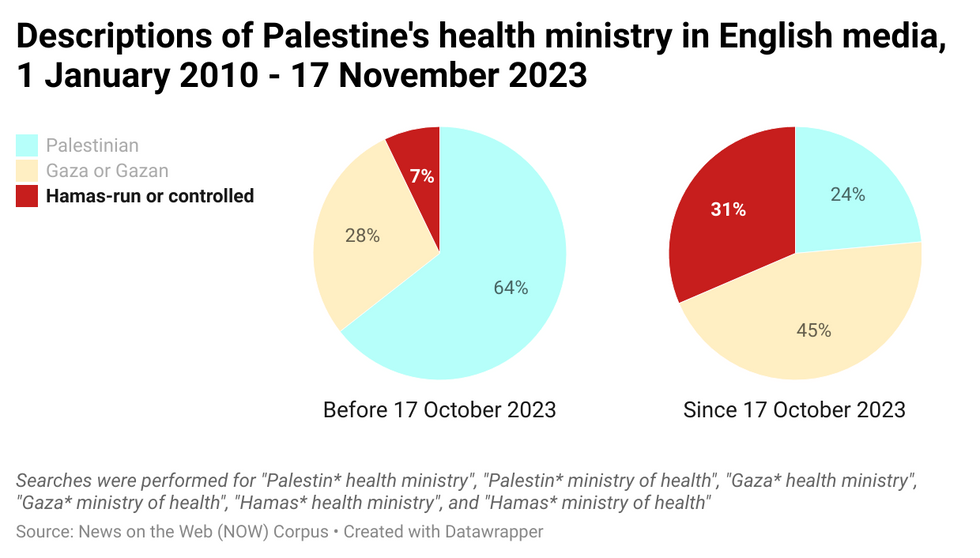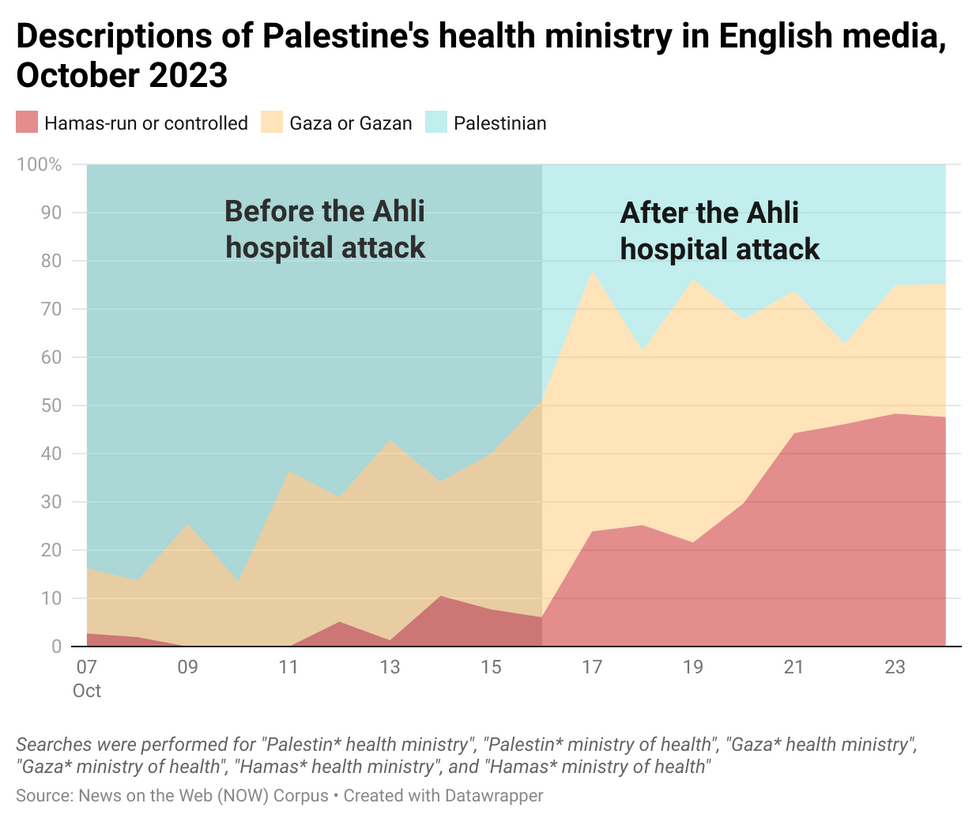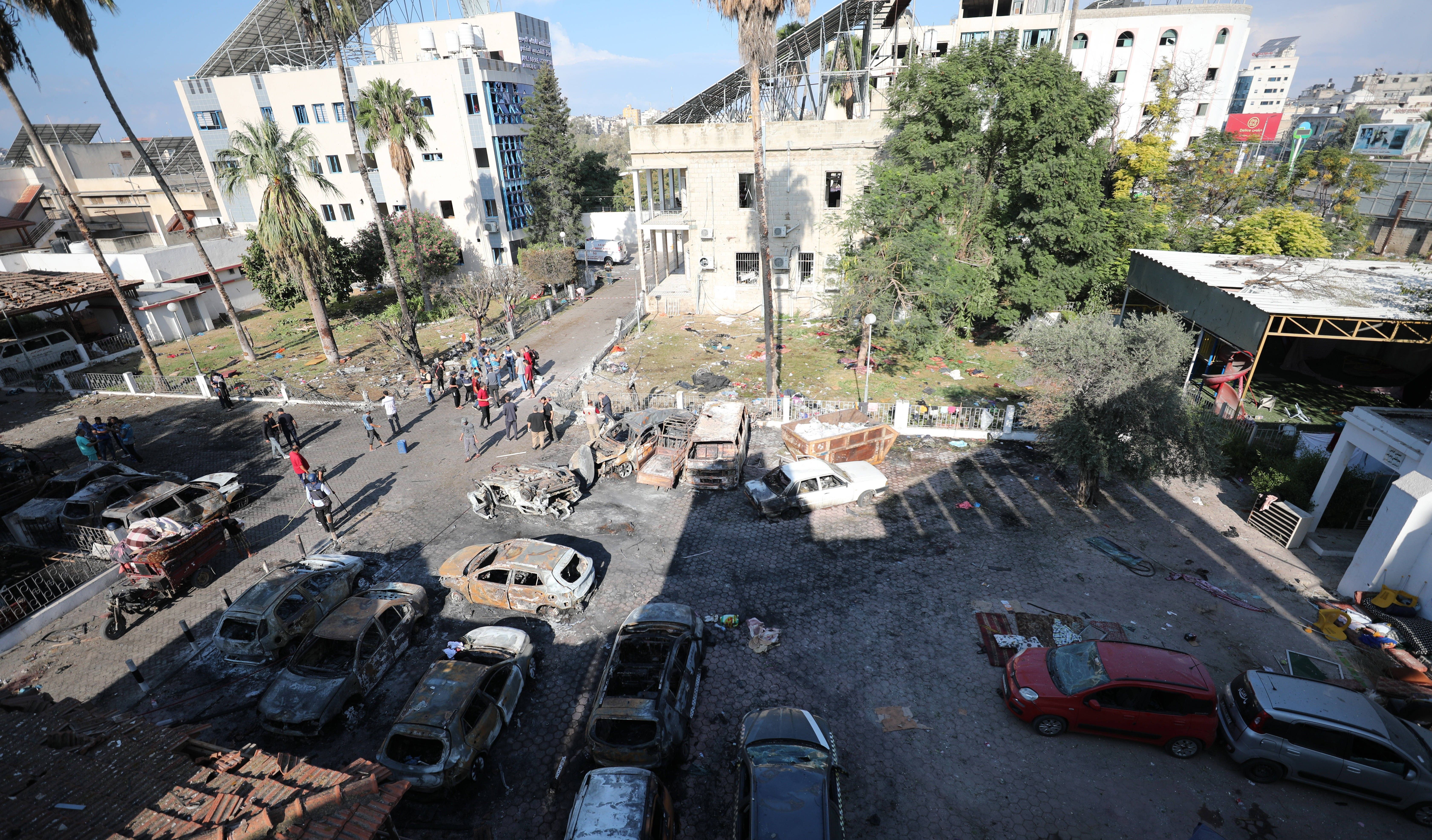Western media never had any problem with health statistics from Gaza — until Israel was accused of bombing a hospital there. For years, English-speaking journalists straightforwardly cited reports from the “Palestinian health ministry in Gaza,” using its official name. But after the October 17 attack on Al-Ahli Baptist Hospital, media outlets began portraying the ministry as an arm of the rebel force Hamas.
Foreign journalists had struggled to make sense of the carnage on October 17, and whether Israeli or Palestinian forces were to blame. The New York Times edited its headline several times, and initially reports may have overstated how many hundreds died. The Israeli army and U.S. President Joe Biden took advantage of the confusion to cast doubt on the truthfulness of Gaza’s medical authorities.
The stakes are critical. The health ministry has reported over 11,000 Palestinian deaths, nearly half a percent of Gaza’s entire population, including thousands of children. Even though U.S. officials have come to accept the accuracy of those numbers, the damage to the health ministry’s credibility is done.
Meanwhile, the Israeli military has moved from attacking the health authorities’ claims to marking them as military targets. Israeli forces raided Al-Shifa Hospital, the health ministry’s headquarters, on Wednesday. Hundreds of doctors, patients, and displaced people have evacuated since. The health ministry has reported severe difficulties updating the death toll due to Israeli attacks, communications blackouts, and the sheer volume of casualties.
Israeli and U.S. attempts to change the conversation have largely succeeded. Before the current war, and even before the Ahli hospital bombing, descriptions like “Hamas-run,” “Hamas-controlled,” or “Hamas-affiliated” for the Palestinian health ministry were virtually non-existent, according to the News on the Web Corpus, a database of newspapers and magazines from 21 countries.
Most Western English language media simply referred to the “Palestinian health ministry.” Since the October 17 hospital attack, however, it is now more common to see the health ministry labeled as some variation of “Hamas-run” than “Palestinian.”

The actual relationship between Gaza’s health ministry and Hamas is complicated. Hamas took over as the governing authority in Gaza in the chaos around a 2007 coup d’etat attempt, splitting Palestinian ministries between staffers loyal to Hamas in Gaza and staffers loyal to the Palestinian Authority in the West Bank.
But the Gazan branch of the health ministry is not completely disconnected from the broader Palestinian medical system, or even the Israeli government. Officials in both the West Bank and Gaza report births and deaths to the same Israeli-controlled population registry. In response to Biden casting doubt on its statistics, the Palestinian health ministry released the name and ID number of every single identifiable person allegedly killed by the fighting.
The current war began on October 7, when Hamas launched an unprecedented attack on Israeli villages, killing 1,200 people and taking around 240 hostages. The Israeli army released a video on Sunday purporting to show two wounded hostages being taken to Al-Shifa. Hamas itself released a video last month claiming to show an Israeli hostage being treated in a Palestinian hospital, but denied keeping any hostages in hospitals for non-medical reasons.
The doubt surrounding the health ministry’s objectivity only began after the Ahli hospital attack. On October 17, an explosion ripped through the courtyard of the hospital, where hundreds of displaced people had been sheltering. Health ministry officials held a press conference surrounded by corpses and accused Israel of committing a massacre.
Israel claimed that a misfired Palestinian rocket had struck Al-Ahli, and presented several contradictory pieces of evidence for that scenario. (Outside investigations have been inconclusive so far, ruling out an Israeli aerial bomb but leaving open the possibility of some other type of Israeli or Palestinian weapon.) Israeli military spokesman Daniel Hagari complained the next day that “many media outlets immediately reported the unverified claims by Hamas, the lies by Hamas.”
Biden jumped in a week later, stating that he “had no notion that the Palestinians are telling the truth about how many people are killed.” He also privately complained about the New York Times’ headlines on Al-Ahli during a meeting with Wall Street bankers, Semafor reported.
“We all know that the Gazan ministry of health is just a front for Hamas. It’s run by Hamas, a terrorist organization,” U.S. National Security Council spokesman John Kirby told reporters on October 26. “We can’t take anything coming out of Hamas, including the so-called ‘ministry of health,’ at face value.”
The political pushback seems to have changed the overall tone of American news coverage. In the weeks after the Ahli attack, many English-language reporters appeared to hedge any Palestinian health ministry claims by noting Hamas’s alleged control of the ministry.

The Associated Press, widely considered the gold standard in English-language reporting, used the term “Hamas-run health ministry” only five times before October 2023. During previous wars, the Associated Press often cited statistics from “the Palestinian Health Ministry in Gaza.”
AP newswires have not used the phrase “Palestinian Health Ministry in Gaza” since the Ahli hospital bombing, instead referring to the “Hamas-run Health Ministry” or the “Health Ministry in Hamas-run Gaza.” It is unclear whether the change was a matter of policy, or simply an ad hoc decision by editors.
The AP press office did not answer an email request for comment. Neither did the New York Times foreign desk, the Reuters newswire service, or the cable news station CNN.
Some journalists have pushed back hard against the notion that Gaza’s health authorities are a Hamas propaganda arm. The Washington Post ran a column on October 24 defending the accuracy of statistics from the Palestinian health ministry.
In the meantime, Israeli forces have escalated their attacks on Palestinian health infrastructure. On November 3, the Israeli army bombed a Palestinian ambulance outside of Al-Shifa. On November 13, an Israeli bulldozer destroyed the Swedish Clinic in Al-Shati Refugee Camp, which had been bombed and overrun by Israeli forces the day before. A day later, the Israeli army shelled Al-Shifa and falsely claimed that misfired Palestinian rockets were to blame.
Israel accuses Hamas of hiding fighters and holding Israeli hostages inside of hospitals. The White House has backed Israeli claims. Kirby, the U.S. spokesman, said on Tuesday that the United States has intelligence about Hamas’s use of hospitals, including a “command and control node” under Al-Shifa. Biden echoed those claims after the Israeli raid on the hospital.
Hagari, the Israeli army spokesman, brought foreign reporters to the basement of the abandoned Rantisi Hospital on Monday to view alleged proof of Hamas’s presence. Israeli forces displayed weapons and explosives that they claimed to have found in the hospital, as well as a bullet-ridden motorcycle.
Journalists were shown a chair with a woman’s gown, a length of rope, and a baby bottle nearby. Hagari promised to test them for DNA evidence of hostages. Health ministry official Muhammad Zarqout told CNN that Palestinian women and children, not Israeli hostages or Hamas fighters, had been staying in the basement.
Hagari also pointed to a chart on a wall, claiming that it was a “guarding list, every terrorist has his own shift.” In fact, the chart was just a calendar with the days of the week written in Arabic. CNN aired Hagari’s claim without pushing back. The Israeli army later chalked it up to a translation error, and CNN quietly removed that segment from videos posted online, according to the Huffington Post.
After Wednesday’s raid on Al-Shifa, the Israeli military shared images of its booty from the supposed Hamas stronghold: fifteen rifles, some grenades, and assorted body armor. “It's a hospital. There shouldn't be any assault rifles at a hospital,” Kirby told reporters on Thursday, smirking.
However, Human Rights Watch stated that the Israeli evidence was not sufficient to attack the hospitals. According to the Fourth Geneva Convention, the presence of “sick or wounded members of the armed forces” does not make a hospital a military target, even if those patients brought along “small arms and ammunition” with them.
CNN and BBC reporters both found that Israeli troops may have tampered with the evidence at Al-Shifa Hospital, a claim that Hagari denies.
Two days after the raid, The Economist reported that “Israeli intelligence officials do not believe that Hamas currently has its main headquarters—to the extent that such a thing exists—below the hospital. These, they say, have probably moved to Khan Younis” south of Gaza City.
Meanwhile, U.S. officials have come around to accepting that Palestinians were telling the truth about their deaths — and may have actually understated the numbers.
“In this period of conflict and conditions of war, it is very difficult for any of us to assess what the rate of casualties are,” Barbara Leaf, assistant U.S. secretary of state for Near Eastern Affairs, told Congress last week. “We think they’re very high, frankly, and it could be that they’re even higher than are being cited.”














